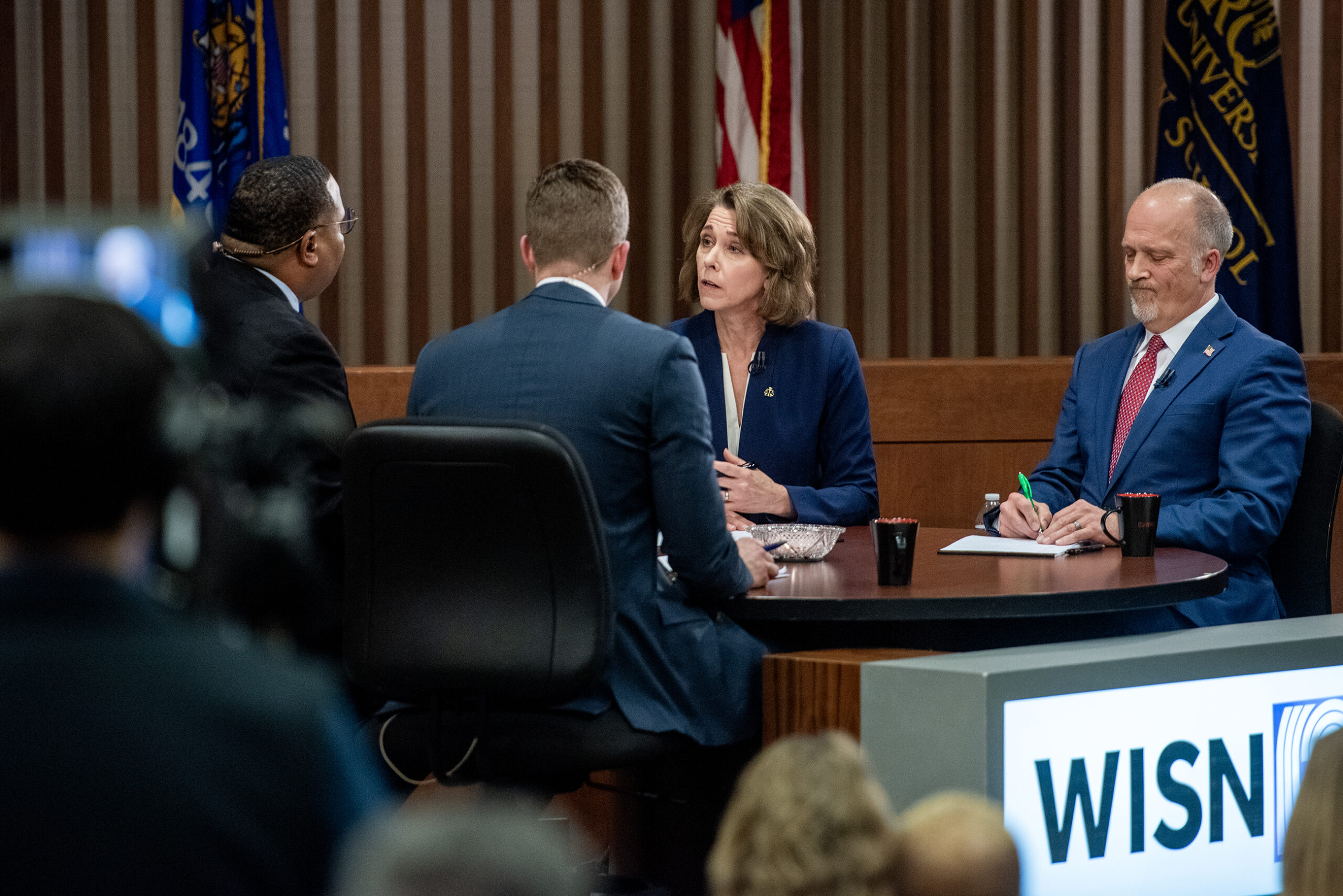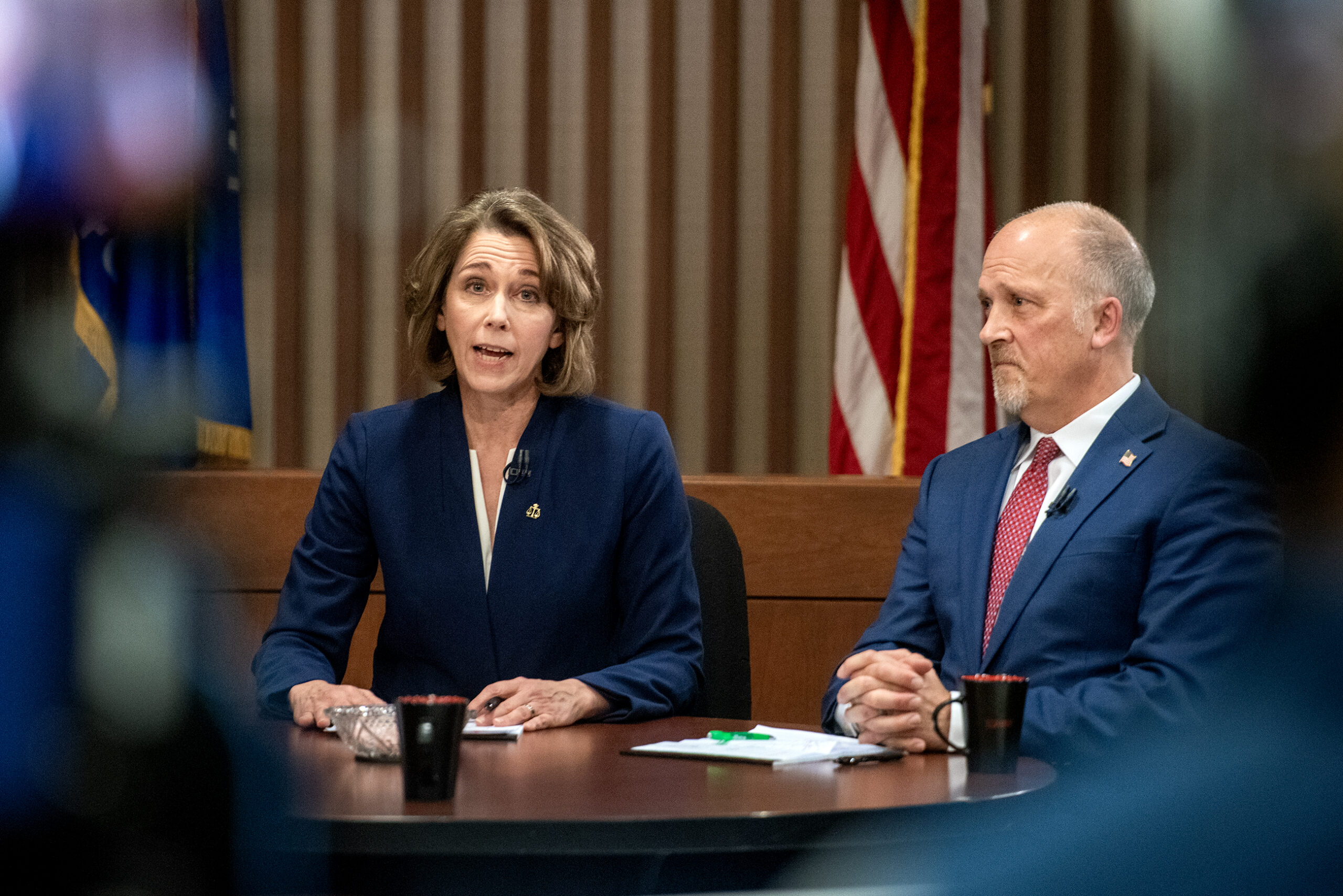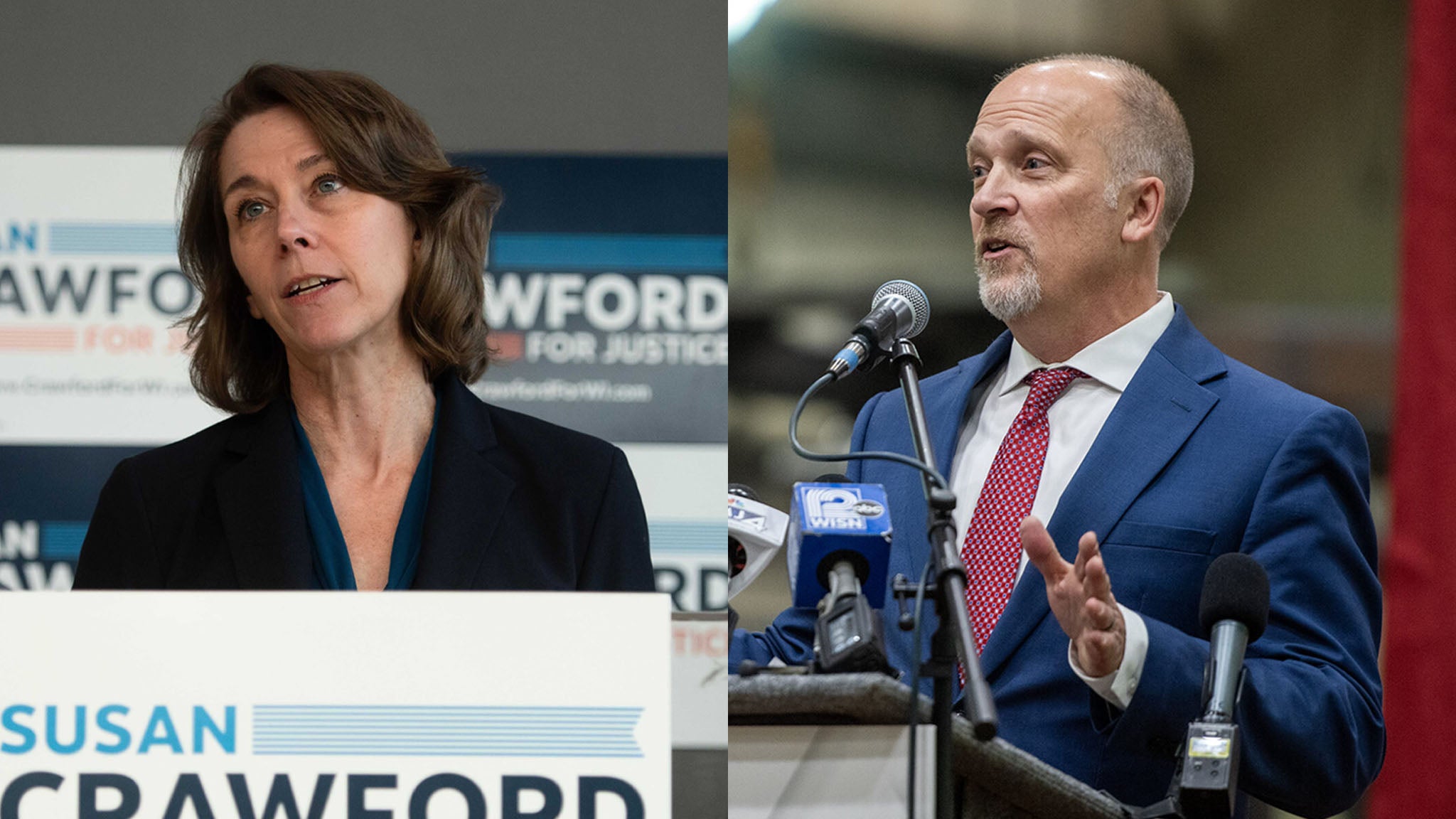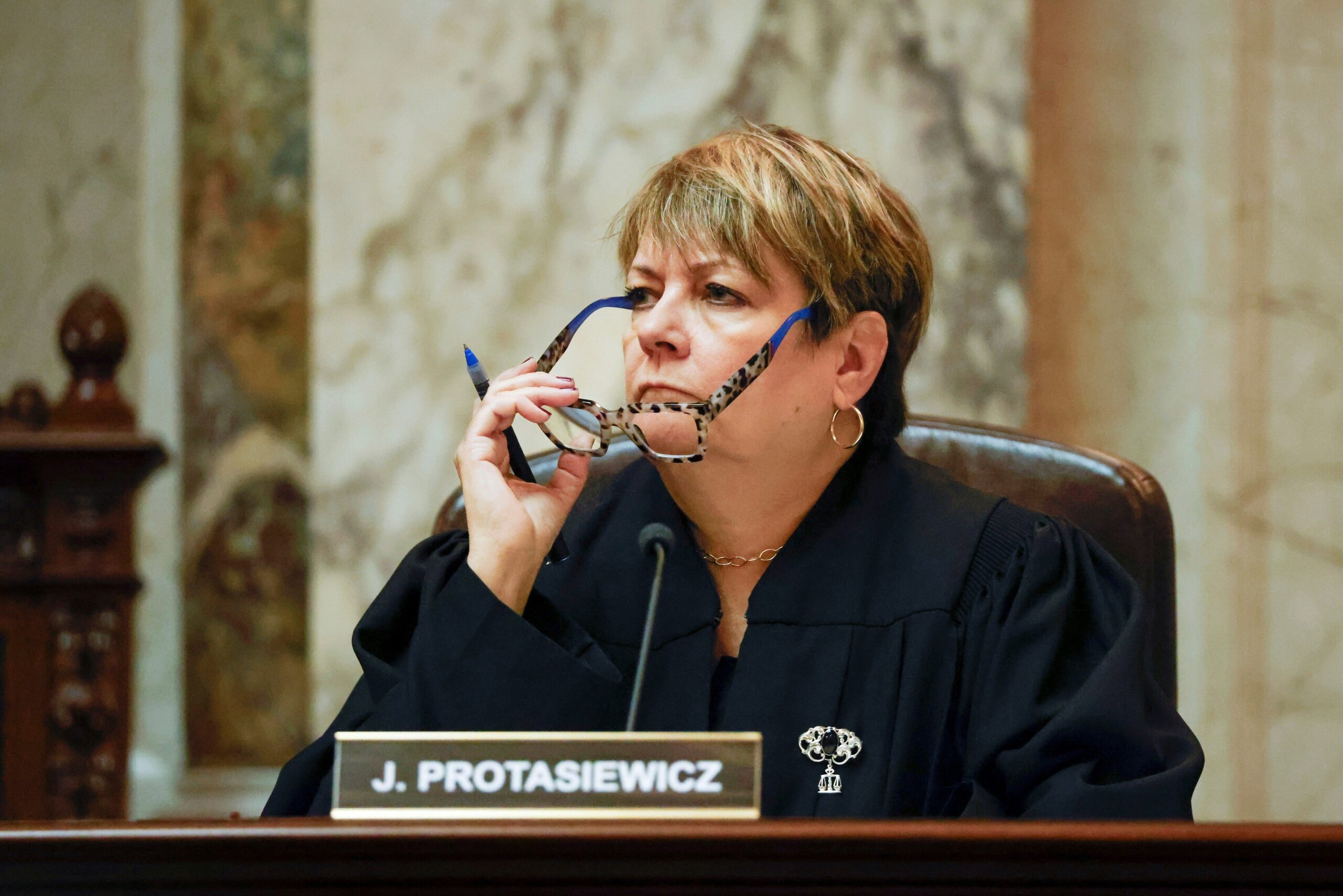Milwaukee County Judge Janet Protasiewicz said recently that those running for the state Supreme Court should share their values with voters in races where candidates typically keep their cards close to their chest.
She is one of four candidates running in the Feb. 21 primary as conservative Justice Patience Roggensack is retiring. The top two candidates will advance to an April general election that could tip the ideological balance of the court, where conservatives currently hold a 4-3 majority.
Protasiewicz and Dane County Judge Everett Mitchell are being backed by liberals. Former state Supreme Court Justice Daniel Kelly and Waukesha County Judge Jennifer Dorow have support from conservatives.
Stay informed on the latest news
Sign up for WPR’s email newsletter.
Wisconsin Public Radio’s “Central Time” recently invited the candidates to discuss their campaigns on the program. Only Dorow declined the invitation.
Protasiewicz, a former prosecutor, has said the U.S. Supreme Court made a mistake when last summer it overturned the landmark Roe v. Wade decision. She has also criticized the state’s electoral maps.
Read about the interviews with Mitchell here and Kelly here. The following from Protasiewicz was lightly edited for brevity and clarity.
Rob Ferrett: What is your case for being on the court?
Janet Protasiewicz: The reason I’m running for the state Supreme Court is to bring back change and common sense to our court. I’m a follow-the-law, common-sense judge — not an uber-partisan. There has been so much extreme partisanship on our Wisconsin Supreme Court, and that’s why I’m running.
RF: Groups that support you view you as a liberal. So do groups that oppose you. What would you say to them?
JP: Labels are interesting. Yes, I am very, very progressive when it comes to social issues. But I would also say that there are issues that, quite frankly, go across all party lines, such as community safety, judicial philosophy, being a fair jurist, being nonpartisan, not having a thumb on the scale when it comes to issues that are going to come before the Supreme Court, and not being an activist judge. We need common sense. We don’t need extreme partisanship, and I will root every decision in the law.
RF: One decision that could come before the court again is the state’s election maps. You’ve described the current maps and the system that created them unfavorably. Could Republicans count on you to not have your thumb on the scale?
JP: Absolutely. I said the maps are rigged. Wisconsin is a battleground state. I don’t think you could sell to any rational person that the maps are fair. Just look at them with the numbers in the Wisconsin State Senate (and) the numbers from the Wisconsin State Assembly. Just look at those numbers. You know that something is wrong.
But what I have told everyone: While I state that those maps are rigged and while I talk about some of the other issues that are important to both me and all Wisconsinites, all of my decisions are going to be rooted in the law. I plan to follow the law. I tell you what my values are because I think that Supreme Court candidates should share with the community and the electorate what their values are. Nonetheless, I will uphold the law (and) follow the Constitution when I make any decisions. Nothing is prejudged.
RF: How would you handle the ongoing legal conflict around the state’s 1849 abortion ban? The state Department of Justice contends it is in conflict with a later law.
JP: I can’t make any specific comments as to what I would do when elected as a Supreme Court justice. What I have told people regarding the 1849 (ban): I have been very, very clear that my values are that women have the right to choose. I have stated that I disagreed with the (U.S.) Supreme Court’s decision on this. Quite frankly, I was surprised when the U.S. Supreme Court decided to take away a fundamental right that so many people in our country had for such a long time.
I would also say that this is the same type of decision making that people are tired of. They don’t want that from our Wisconsin Supreme Court. So, we currently have a majority on the court who are making decisions based on right-wing partisan beliefs — not the Constitution and not the law. We need to bring that change back to the courts. We should get away from that right-wing extremism and back to common sense.
READ MORE: Wisconsin Supreme Court candidates discuss abortion, redistricting at Madison forum
RF: What would be your standards for when you should recuse yourself from a particular case on the state Supreme Court?
JP: There needs to be a recusal rule. I have been very, very open about that. Just what the standard and what the contribution limit needs to be in order to have someone recuse themselves, there needs to be a public hearing. The public absolutely needs to weigh in on that. But I really, really believe a recusal rule is appropriate for lots of reasons.
Other candidates have opposed additional rules. I think that’s wrong. I will obviously follow any recusal rules. But there are people who really believe that so much money is being poured into these races and so much of it by outside groups — should a Supreme Court justice really sit on a case where millions of dollars of outside money have come in on your behalf? I don’t think that people think that’s fair. People think that that puts a thumb on the scale.
RF: Usually, voters are picking politicians to enact certain policies they like. How should voters decide what judge to vote for?
JP: You have to look at the person’s judicial philosophy — how they plan to run their courtroom, how they plan to treat people, whether or not they are able to be fair and appropriate under all circumstances. Judicial philosophy, it’s critical. I tell people I can’t tell you where I’m going to end up on a case, but I can tell you I’m going to root my decisions in the law.
We need to get away from hyper-partisanship and predetermined outcomes by ideologues. We absolutely need to do that. The Supreme Court should be different in many instances than the other branches of government. People should really, really be able to look up to our Supreme Court and believe that it is a bastion of dignity and integrity and that they are going to have a fair shake across the board in our courts.
Wisconsin Public Radio, © Copyright 2025, Board of Regents of the University of Wisconsin System and Wisconsin Educational Communications Board.




